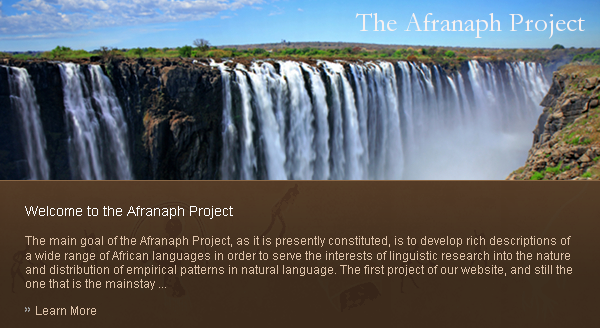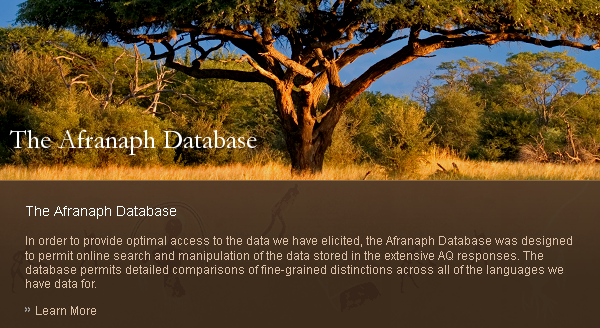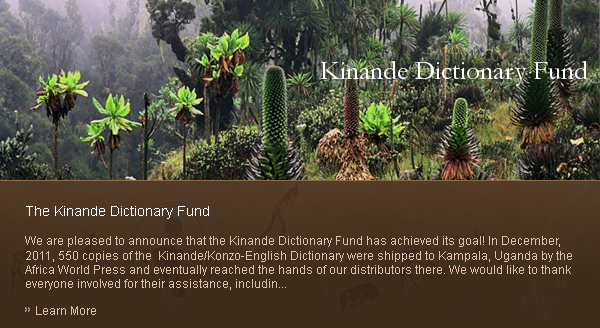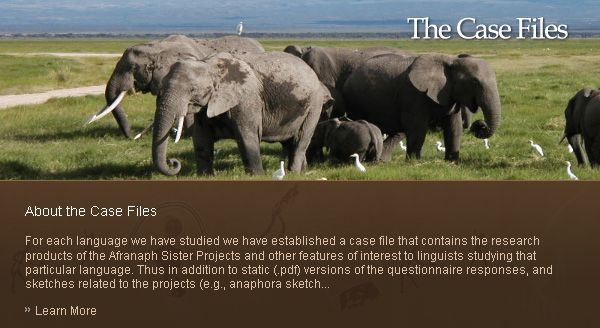- Last Updated on Thursday, 31 August 2023 09:50
Article Index
![]()
Download: Afranaph Questionnaire in English [pdf] [doc] | et en Français [pdf] [doc] | Clausal Complementation Questionnaire [pdf] [doc] | Properties of Subjects in Bantu Questionnaire[pdf] [doc] | DP Positions Questionnaire [pdf] [doc] | Noun Class Prefix Questionnaire [pdf] [doc] | Questionnaire on Tense and Aspect in African Languages [pdf] [doc] | Object Marking Questionnaire [pdf] [doc] | Additional Notes for Consultants [pdf] | Afranaph Consultant Information and Consent Form [pdf]
The life-blood of our work is the information that only our consultants have access to, namely, their native speaker intuitions and the training they have to make those intuitions most efficiently available to us. For example, our consultants must often use their linguistic training to make sense of a poorly asked question by an ignorant analyst and return information that is useful to our common purpose: the exploration, and in the best case, explanation, of empirical patterns in natural language. Thus it is a collaborative enterprise, and some documents are likely to result, particularly the anaphora sketch, that will be the result of that collaboration.
To become a consultant to the Afranaph project, you have to be a native speaker of a non-Colonial language of Africa and a trained linguist. Participation in our project is voluntary and non-contractual. We do pay our consultants for various levels of participation, but the reality of the situation is that we cannot pay what the work is worth. Besides the general benefit your participation will bring to the linguistic research community, we like to think we are providing our consultants with an opportunity that brings their efforts for the project, their language, and other work they have done, to the attention of a wider world community of linguists interested in a broad range of theoretical and (to a lesser extent) practical questions. If you are a young scholar and you want to enter the world community of Africanist linguists, theoretical linguists and typologists, or both, it is not unrealistic to view your participation in our project as making a contribution that will be unique and significant. If you are already part of that community, then you know what your potential contribution is worth and we hope you will take this opportunity to share it with us. Although it is possible and anticipated that some linguists may choose not to reveal their identities in order to participate in the project, we find that most of our consultants do wish to be known, and some of these consultants may be asked to contribute to some of the other aspects of our case files, including the grammar sketch, collaborations with directors of the Afranaph Sister Projects, the translated tale (with morpheme breakdowns and glosses) the bibliography and so forth.
There are now a variety of Afranaph Sister Projects that consultants can participate in. Participation in any one project, specifically by filling out a questionnaire for it, does not require participation in any of the other projects, but we encourage our consultants to participate in as many projects as possible so that a broader picture of their language can emerge from the data that our project can put on view. If, after reviewing one or more of the questionnaires and checking out the remuneration possibilities you have decided to participate, then the next page to consult is the Consultant’s Page, where more detailed instructions for participation are available.
Getting Started
If you decide you are interested in participating in our project as a consultant, we urge you to begin by deciding which questionnaire you would like to begin with. Naturally, consultants will tend to look first at the questionnaires for the projects that interest them, but just for comparison, we recommend that you look at more than one. Some questionnaires will make much greater demands on your time than others, and if you would like to begin by answering one of the less time-consuming ones, then consult the About Compensation page where the schedule of fees reflects our estimation of which projects are likely to be the most time-consuming. The AQ, for example, for which we offer the most compensation, is very long and detailed and so it is important to assess how much is expected before you make a commitment.
When you have made these assessments, then please contact us by email (Contact Us) and let us know which project or projects you would like to answer questionnaires for. In your first message, please also tell us a bit about yourself, including a brief account of your linguistic training, the language(s) you speak natively, your affiliation, if you have one, and how we may most conveniently maintain contact with you. At some point, before we can use any data you send us, you must fill out the Consultant Information and Consent Form, which includes this information and more, and once you have filled it out once, you don’t have to fill out again for participation in any new sister project. We will then put you in touch with the investigators for the Afranaph Sister Project that the questionnaire is for (if you are not already in touch, or have come to us through them). Thereafter, most of your contact will be with project investigators for each of the sister projects you are answering a questionnaire for.
As soon as it is agreed between us that you will become a consultant for Afranaph, please go to the Consultant’s Page, which provides necessary documents and includes a variety of instructions designed to simplify your experience and standardize, as much as possible, the procedures for presenting data to us.
About compensation
Back to Become a Consultant home
About compensation
Although we realize that most of our consultants participate in our project out of curiosity about their own language, in order to bring attention to their language as the object of theoretical study, to participate in linguistic inquiry generally, to expand their range of academic contacts, and so forth, and we hope to deliver on those aspirations, we also recognize that the work of our project is not a trivial commitment of time and effort and that it should be remunerated, however inadequately. So, although we know that what we ask of our native speaker linguist consultants is worth more than what we could pay, in the past, while the NSF support was active, we did pay something. However, after 20 years, our funding was retired when I (Ken Safir) retired from Rutgers in June 2023. It is possible that we will find new funds going forward, but we cannot count on being able to pay our consultants in the future. Below is the schedule of what we would like to be able to pay, but we cannot promise we will have money to pay anyone. In other words, right now we can only pay in aspirational dollars, not real ones.
AQ - $400 for completion of first draft of AQR. $200 more for two or more follow-ups.
CCQ - $400 for completion of first draft. $200 more for two or more follow-ups.
DPPQ – discontinued.
NCQ – discontinued.
OMQ - $400 for completion of first draft. $200 for completion of follow-up.
SSBQ – discontinued.
TAQ – discontinued.
Completion and credit: The Afranaph staff researcher editing your questionnaire response must confirm that a questionnaire has been completed and then you will then receive email from Afranaph stating what your credit amount is according to the aspirational payment schedule in effect at the time of completion. If we can find money to pay you, we will.
Cash Payment: It is possible that some payments can be made from funds to be made available by the Rutgers Linguistics department, and in that case, there is a bureaucratic procedure that must be followed. Payment can be made by balance transfer or Western Union draft in that case. If payment is not made through Rutgers, then payment is more likely to be made through Western Union.
The Laptop Option: We used to ship laptop computers to consultants who had reached a certain threshold of payments, but that option has been discontinued, since it is now easier for our consultants to make their own purchases in Africa and the cost of shipping is now prohibitive.
We used to be able to make additional payments for the preparation of documents (e.g., grammar sketches). Payment for such contributions is unlikely going forward. Unless you request anonymity, we will publish a profile of you (which you provide) on the Case File page for your language.




 Become a Consultant
Become a Consultant
